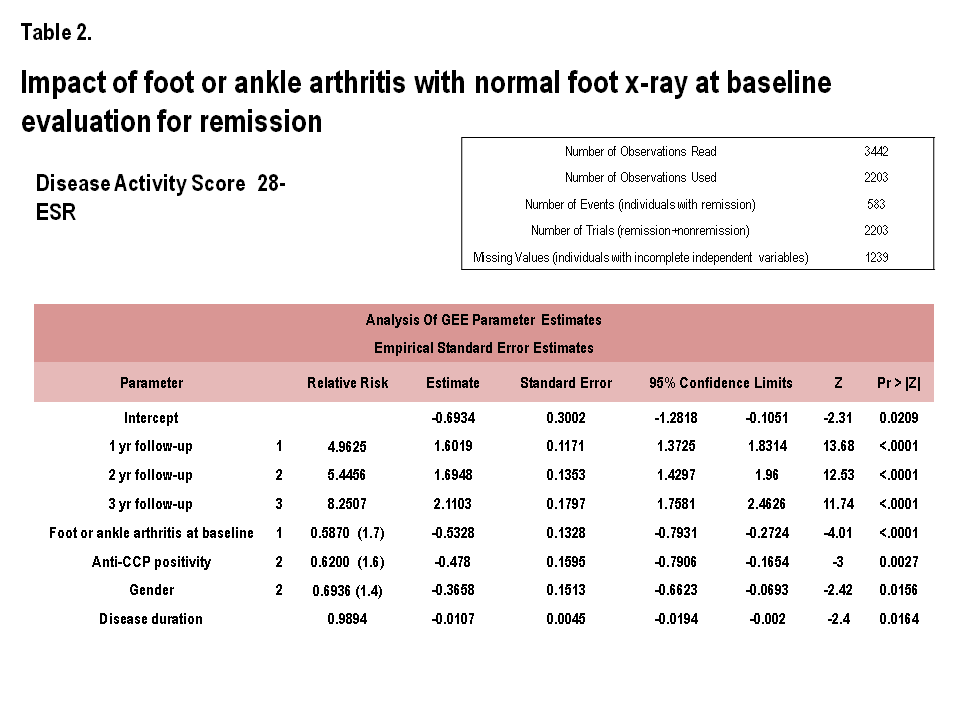Session Information
Date: Monday, November 6, 2017
Session Type: ACR Poster Session B
Session Time: 9:00AM-11:00AM
Background/Purpose: The objective of the current study is to evaluate the clinical importance of foot and ankle joint arthritis.
Methods: Data from Korean Biologic Registry (KoBio) data were analyzed. Foot and/or ankle arthritis defined as one or more swollen and/or tender joint among 1st-5th metatarsal or ankle joints. A chi-square analysis was employed to calculate the relative risk (RR) of remission for patients with foot and/or ankle arthritis among. Marginal model was applied to assess prognostic effect of foot and/or ankle arthritis adjusting positive rheumatoid factor, anti-CCP antibody and radiographic abnormalities
Results: A total of 2026 patients (biologic disease modifying anti-rheumatic drugs, R, n=1400 non-biologic DAMRDs treatment group, C, n=626) at baseline, 1554 patients (R, n=1046, C, n=508) at 1 year follow-up, 1068 patients (R, n=712, C, n=356) at 2 year follow-up, and 472 patients (R, n=327, C, n=145) were enrolled. At baseline evaluation, prevalence of foot synovitis was 29.4% of total patients (595 of 2026). Patients with foot or ankle arthritis (Group 1) were less likely to achieve clinical remission (using Disease Activity Score 28 ESR, DAS-28 ESR) compared to patients without foot and ankle arthritis (Group 2); remission rate of Group 1 vs Group 2 was 11.7 % vs 39.7% (p<0.001) at 1 year, 18.1 % vs 40.1 % (p<0.001) at 2 year, and 23.1 % vs 44.5 % (p<0.001) at 3 year follow-up. They were also tend to have functional impairment (using Routine Assessment of Patients Index Data, RAPID3); remission rate of Group 1 vs Group 2 was 5.0 % vs 20.4% (p<0.001) at 1 year, 9,0 % vs 18.5 % (p<0.001) at 2 year, and 3.1 % vs 20.3 % (p<0.05) at 3 year follow-up. Even among patients without radiographic abnormalities (joint space narrowing or erosion) in baseline foot x-ray, Group 1 patients showed significantly low clinical remission rate; remission rate of Group 1 vs Group 2 was 12.9 % vs 40.7 % (p<0.001) at 1 year, 15.3 % vs 41.3 % (p<0.001) at 2 year, and 26.2 % vs 47.7 % (p<0.001) at 3 year follow-up. Presence of foot and/or ankle arthritis at baseline or at any time point of observation period was associated with poor prognosis (Table 1, 2).
Conclusion: Foot and/or ankle arthritis is associated with less achievement of clinical remission.
Table 1. Impact of foot or ankle arthritis at baseline assessment for remission
Table 2. Impact of foot or ankle arthritis with normal foot x-ray at baseline evaluation for remission
To cite this abstract in AMA style:
Chang SH, Lee SW, Kang MI, Kim SY. Foot Arthritis : Poor Prognosis Factor in RA [abstract]. Arthritis Rheumatol. 2017; 69 (suppl 10). https://acrabstracts.org/abstract/foot-arthritis-poor-prognosis-factor-in-ra/. Accessed .« Back to 2017 ACR/ARHP Annual Meeting
ACR Meeting Abstracts - https://acrabstracts.org/abstract/foot-arthritis-poor-prognosis-factor-in-ra/


